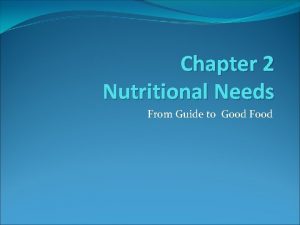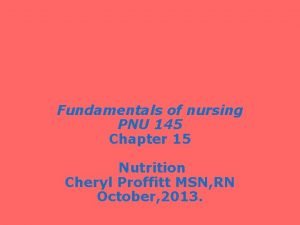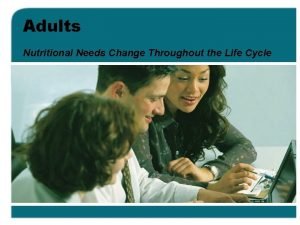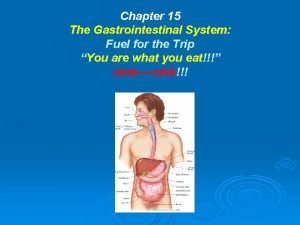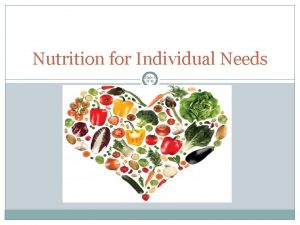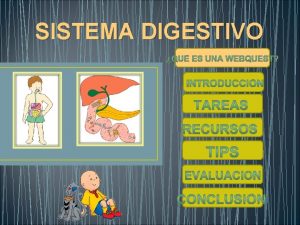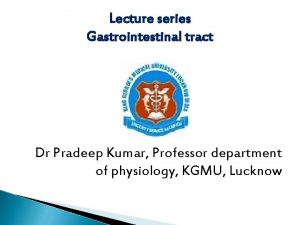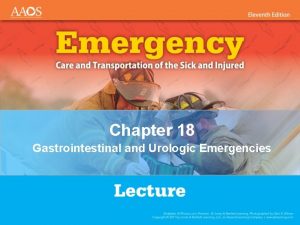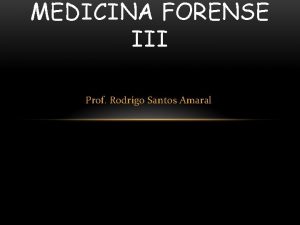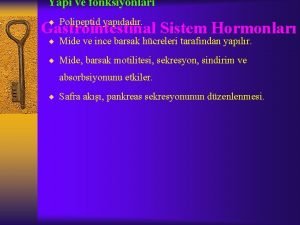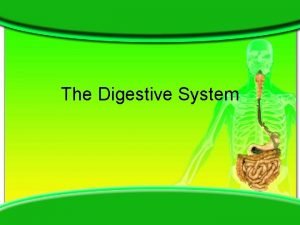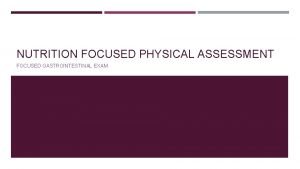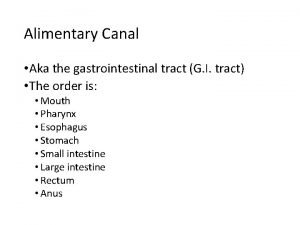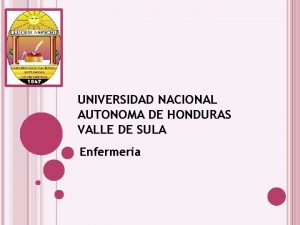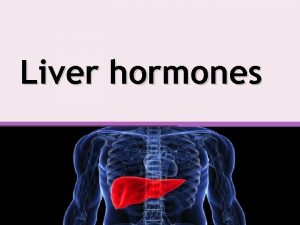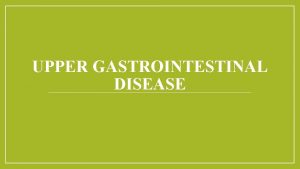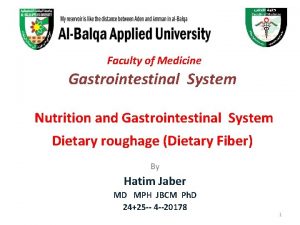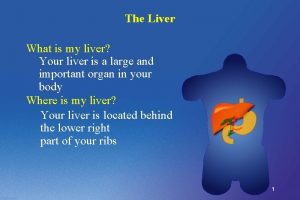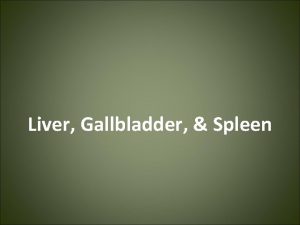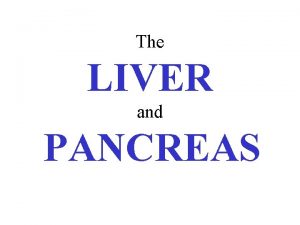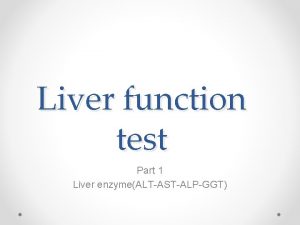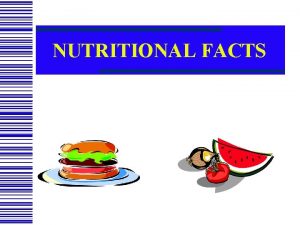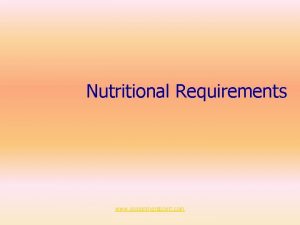Gastrointestinal System Liver Nutrition Nutritional needs of the

















- Slides: 17

Gastrointestinal System Liver Nutrition

Nutritional needs of the patient with liver disease Nutritional Needs of Patients with Liver Disease “Accelerated Starvation”: It would take a healthy adult 72 hours of starvation to reach same level of fat & muscle breakdown as occurs in overnight fasting for cirrhotic patient (due to low liver & glycogen stores)

What Does the Liver Do? Nutrition Related Functions OManufacturing Plant OStorage Facility OWaste Disposal

Manufacturing Functions O Protein- for the bloodstream (albumin) O Glycogen- storage form of glucose for energy O Bile- to help digest fats that are needed for cell structure and energy) O Cholesterol – and special proteins to carry fat through the blood

Storage Facility OGlycogen-released when our bodies need energy (this includes during sleep for basic metabolism) OIron- most is stored in the liver

Common Problems that Interfere Eating O O Decreased abdominal room due to ascites Delayed gastric emptying Decreased appetite Poor nutrient absorption: O Decreased bile production = low fat absoprtion O Diarrhea O Overzealous diet restrictions O Altered mental status/ encephalopathy

Waste Disposal O Ammonia - from the breakdown of dietary protein and muscle tissue O Bilirubin - from the breakdown of red blood cells O Bacteria – removed from the bloodstream O Drugs and Alcohol - are metabolized in the liver

Common Problems that Interfere Eating O Decreased abdominal room due to ascites O Delayed gastric emptying O Decreased appetite O Poor nutrient absorption: O Decreased bile production = low fat absorption O Diarrhea O Overzealous diet restrictions O Altered mental status/ encephalopathy

How Diet Can Help with Symptoms O Fluid Gain: Ascites, Edema O 1. Low Sodium Diet: decreases water/ fluid retention O 2. Adequate protein: keeps fluid O in the arteries and veins rather than leaking into tissues O 3. Avoid Excessive Fluid Intake

Low Sodium Diet O 2000 - 2400 mg Sodium/ day O <200 mg/ serving or 700 mg/ meal O Replace salt shaker with herb shaker O Stock kitchen with fresh unprocessed foods O Avoid eating out- eat in! O Be patient- tastes change

Fluid Intake O Avoid overhydration- usually 6 -8 cups/day is adequate (48 -64 oz) O Suck on ice chips, candy or gum rather than guzzling water O If low serum sodium is an issue, may need a fluid restriction O Avoid dehydration O however-can lead to renal problems

Protein Intake O Meat Group: 4 -5 oz. /day for women or oz. /day for men, plus 1 -2 cups milk/day OAdequate to: O maintain muscles protein levels in blood O Protein Restriction: only used as last resort O Cases of TIPS or no improvement in encephalopathy O First try medicines: lactulose, Neomycin, Metronidazole O More common causes of encephalopathy: O GI bleed, infection, medicines, missed lactulose doses

Small Frequent Meals O Ascites- decreases room in stomach O Muscle wasting- from low glycogen stores O Nausea O Blood sugars

Gastroparesis O Control blood sugars if diabetic O Avoid gut slowing meds if possible such as many painkillers O Use liquids over solids if necessary O Avoid high fiber, high volume foods O May need meds to increase GI motility

Avoiding Toxicity O Bacteria: O -no uncooked shellfish O wash hands prior to eating O keep leftovers refrigerated O Protein waste products: O avoid too little protein intake (increases muscle breakdown) O avoid too much protein intake O Alcohol and over-the counter meds- check all drugs with doctor

Supplements O Zinc- lost in urine O Milk Thistle - likely harmless but not shown to be beneficial O SAMe- (s-adenosylmethionine) - May be beneficial but expensive O 400 mg QID O Betaine- from juice of sugar beet O Helps decrease homocysteine levels O 10 grams 2 x’s day O Ongoing trials

Remember O Check with Doctor to see if any special restrictions are needed O Consult with a dietitian as needed O Don’t wait until signs of malnourishment are advanced to take action
 Chapter 2 nutritional needs
Chapter 2 nutritional needs Nutritional needs in fundamentals of nursing
Nutritional needs in fundamentals of nursing Nutritional needs throughout the life cycle
Nutritional needs throughout the life cycle Chapter 15 the gastrointestinal system
Chapter 15 the gastrointestinal system Nutrition for individual needs
Nutrition for individual needs Embriologia del sistema gastrointestinal
Embriologia del sistema gastrointestinal Gastrointestinal tract
Gastrointestinal tract Chemotrypsinogen
Chemotrypsinogen Emt chapter 18 gastrointestinal and urologic emergencies
Emt chapter 18 gastrointestinal and urologic emergencies Gastrointestinal hormones
Gastrointestinal hormones Sigid djuniawan
Sigid djuniawan Sinal de lichtenberg medicina legal
Sinal de lichtenberg medicina legal Gastrointestinal sistem hormonları
Gastrointestinal sistem hormonları Gastrointestinal medical terminology breakdown
Gastrointestinal medical terminology breakdown Focused gi assessment
Focused gi assessment Forgut midgut hindgut
Forgut midgut hindgut Gastrointestinal tract
Gastrointestinal tract Motilidad gastrointestinal
Motilidad gastrointestinal
